Leadership Courses in Los Angeles, CA


Leadership Training Leadership Courses in Los Angeles, CA
Strong leadership drives performance, retention, and culture — especially in Los Angeles where industries move fast and teams are diverse. Our leadership training and leadership courses in Los Angeles, CA are designed for professionals and organizations ready to convert leadership potential into predictable results. Whether you need an introductory fundamentals course for new managers or an advanced program for senior leaders, these Los Angeles-focused programs address local challenges like hybrid schedules, cross-cultural teams, and high-turnover industries.
Why local leadership training matters in Los Angeles
Los Angeles workplaces face distinct conditions: heavy commuter traffic and long workdays that favor flexible delivery, a multicultural workforce needing high emotional intelligence, and industry pressure in tech, entertainment, healthcare, and startups. Leadership training tailored to these realities improves on-the-job application, reduces turnover, and accelerates team alignment. Local delivery options also allow for in-person immersion when deep culture work is required.
Course levels compared: from foundational to advanced
- Introductory / First-time managers
- Focus: role transition, delegation, performance conversations, setting expectations.
- Ideal for supervisors, team leads, or individual contributors stepping into management.
- Typical format: 1-2 day workshops or a 4- to 6-week blended series.
- Intermediate / Emerging leaders
- Focus: coaching skills, situational leadership, team dynamics, conflict navigation.
- Target: managers with 1-5 years experience who need tools for scaling teams.
- Typical format: cohort-based programs with peer practice and application projects.
- Advanced / Strategic leaders
- Focus: strategic influence, organizational alignment, culture shaping, leading change.
- Target: directors, VPs, executives, and founders.
- Typical format: multi-day immersive residencies, executive coaching, and action learning sprints.
Core topics covered in our leadership courses
Most courses include a blend of experiential learning and practical frameworks covering:
- Communication skills: storytelling, executive presence, and clarity in virtual and in-person settings
- Team building: psychological safety, role clarity, and performance rhythms
- Conflict resolution: diagnosing conflict, structured conversations, and restorative approaches
- Coaching and feedback: development conversations, growth planning, and calibration
- Decision making and problem solving: frameworks for prioritization and risk assessment
- Change leadership: stakeholder alignment, influencing without authority, and sustaining adoption
- Diversity, equity, and inclusion basics: culturally responsive leadership and inclusive team design
Delivery formats: in-person, virtual, and blended
- In-person workshops
- Best for high-engagement team alignment and culture work.
- Ideal for Los Angeles-based off-sites where immersive experiences and role-play create lasting behavior change.
- Virtual instructor-led
- Designed for distributed teams or when travel and LA traffic limit in-person attendance.
- Short modules with practical assignments to ensure application between sessions.
- Blended programs
- Combine online coursework, cohort discussion, live facilitation, and optional in-person intensives.
- Effective for organizations balancing operational demands with deep development needs.
Target audiences and recommended paths
- New managers: Introductory modules plus 30 days of follow-up coaching
- Frontline supervisors in hospitality, retail, and healthcare: Practical communication and conflict resolution courses
- Mid-level managers in tech and entertainment: Team execution and stakeholder influence programs
- Senior leaders and executives: Advanced residencies, strategic alignment workshops, and executive coaching
- Cross-functional leaders: Programs that emphasize collaboration, role clarity, and matrix management
How we diagnose needs and design a course
- Intake and needs assessment: brief stakeholder interviews, role analysis, and goal setting
- Pre-work diagnostics: optional 360 feedback, team pulse surveys, or behavioral assessments
- Customization: align topics and case studies with Los Angeles-specific scenarios and industry context
- Measurement plan: establish success metrics such as engagement, retention, manager effectiveness, and business KPIs
Typical course structure and learning outcomes
- Structure:
- Pre-reading and assessment
- Live workshops (single day to multi-day)
- Application sprint or team project
- Post-course coaching or follow-up labs
- Outcomes participants and organizations can expect:
- Clearer communication and fewer escalation cycles
- Faster onboarding of new managers and reduced first-year manager failure
- Improved team cohesion and consistent performance rhythms
- Greater ability to lead through ambiguity and change
Scheduling and pricing models (what to expect)
- Scheduling options take Los Angeles realities into account:
- Weekday half-day sessions to avoid rush-hour travel
- Evening or condensed weekend formats for executive availability
- On-site multi-day off-sites for team immersion
- Virtual cohorts scheduled across Pacific Time for convenience
- Pricing models are typically structured as:
- Per-participant for open-enrollment cohorts
- Program-based flat fees for private cohorts, including customization and facilitation
- Add-on fees for assessments, long-term coaching, or on-site logistics
- Typical program lengths range from single-day workshops to multi-week cohorts or intensive 2-3 day residencies for advanced tracks
Proven methods and how training converts to results
Programs emphasize experiential learning and sustained practice rather than passive lecture. Common elements that convert learning into lasting behavior include:
- Role plays and real-time feedback calibrated to participant roles
- Action plans tied to business priorities with measurable check-ins
- Peer accountability within cohorts to accelerate application
- Leader coaching focused on specific performance objectives
Maintenance and long-term development
Leadership development is ongoing. Effective maintenance strategies include:
- Quarterly refreshers or micro-learning modules
- Peer coaching circles or leadership huddles
- Integration into performance plans and succession processes
- Ongoing measurement and recalibration of program focus as teams or market conditions change
Leadership courses in Los Angeles, CA should be practical, flexible, and tied to measurable outcomes. By matching course level, delivery format, and content to your team’s schedule and industry context, leadership development becomes a predictable driver of performance and culture.

